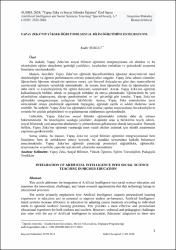Yapay Zeka’nın yüksek öğretimde sosyal bilim öğretimine entegrasyonu
Citation
Turgut, K. (2024). YAPAY ZEKA’NIN YÜKSEK ÖĞRETİMDE SOSYAL BİLİM ÖĞRETİMİNE ENTEGRASYONU. Ankara Uluslararası Sosyal Bilimler Dergisi(Yapay Zeka ve Sosyal Bilimler Öğretimi), 1-7.Abstract
Bu makale, Yapay Zeka’nın sosyal bilimler eğitimine entegrasyonunu ele almakta ve bu
teknolojinin eğitim süreçlerine getirdiği yenilikleri, karşılaşılan zorlukları ve gelecekteki araştırma
fırsatlarını incelemektedir.
Makale, öncelikle Yapay Zeka’nın eğitimde kişiselleştirilmiş öğrenme deneyimlerini nasıl
desteklediğini ve öğrenci performansını artırma potansiyelini vurgular. Yapay Zeka tabanlı sistemler,
öğrencilerin öğrenme süreçlerini optimize etmek için bireysel ihtiyaçlarına göre ders materyallerini
uyarlayarak eğitimde verimliliği artırmaktadır. Bu durum, hem öğrenciler hem de öğretmenler için
daha etkili ve kişiselleştirilmiş bir eğitim deneyimi sunmaktadır. Ancak, Yapay Zeka’nın eğitimde
kullanılmasıyla birlikte, teknik ve pedagojik zorluklar da ortaya çıkmaktadır. Eğitimcilerin bu yeni
teknolojilere adaptasyonu, altyapı gereksinimleri ve veri güvenliği gibi konular, Yapay Zeka’nın
eğitimdeki entegrasyonunu zorlaştıran faktörlerdir. Ayrıca, Yapay Zeka sistemlerinin karar
süreçlerinde ortaya çıkabilecek algoritmik önyargılar, eğitimde eşitlik ve adalet ilkelerine zarar
verebilir. Bu nedenle, Yapay Zeka’nın eğitimdeki rolü üzerine yapılan araştırmaların, bu teknolojilerin
sorumlu bir şekilde geliştirilmesi ve uygulanmasına odaklanması gerekmektedir.
Gelecekte, Yapay Zeka’nın sosyal bilimler eğitimindeki rolünün daha da artması
beklenmektedir. Bu teknolojinin sunduğu yenilikler, disiplinler arası iş birliklerini teşvik ederek,
sosyal bilimlerde yeni araştırma alanlarının ve yöntemlerinin gelişmesine olanak tanıyacaktır. Bununla
birlikte, Yapay Zeka’nın eğitimde yaratacağı uzun vadeli etkileri anlamak için sürekli araştırmalar
yapılması gerekmektedir.
Sonuç olarak, bu makale, Yapay Zeka’nın sosyal bilimler eğitimine entegrasyonunun hem
fırsatlarını hem de zorluklarını ortaya koyarak, bu alandaki tartışmalara katkıda bulunmayı
amaçlamaktadır. Yapay Zeka’nın eğitimde yaratacağı potansiyel değişiklikler, eğitimciler,
araştırmacılar ve politika yapıcılar için önemli çıkarımlar sunmaktadır. This article addresses the integration of Artificial Intelligence into social science education and
examines the innovations, challenges, and future research opportunities that this technology brings to
educational processes.
The article primarily emphasizes how Artificial Intelligence supports personalized learning
experiences in education and its potential to improve student performance. Artificial Intelligence based systems increase efficiency in education by adapting course materials according to individual
needs to optimize students' learning processes. This provides a more effective and personalized
educational experience for both students and teachers. However, technical and pedagogical challenges
also arise with the use of Artificial Intelligence in education. Educators' adaptation to these new technologies, infrastructure requirements, and issues such as data security are factors that make the
integration of Artificial Intelligence in education difficult. In addition, algorithmic biases that may
arise in the decision-making processes of Artificial Intelligence systems can harm the principles of
equality and justice in education. Therefore, research on the role of Artificial Intelligence in education
should focus on the responsible development and implementation of these technologies.
In the future, the role of Artificial Intelligence in social science education is expected to increase
even further. The innovations offered by this technology will encourage interdisciplinary
collaborations and enable the development of new research areas and methods in social sciences.
However, continuous research is needed to understand the long-term effects of Artificial Intelligence
in education.
As a result, this article aims to contribute to the discussions in this field by revealing both the
opportunities and challenges of integrating Artificial Intelligence into social science education. The
potential changes that Artificial Intelligence will create in education offer important implications for
educators, researchers, and policy makers.
Source
Ankara Uluslararası Sosyal Bilimler DergisiURI
https://dergipark.org.tr/tr/pub/usdad/issue/86150/1542914https://hdl.handle.net/20.500.12780/947


















